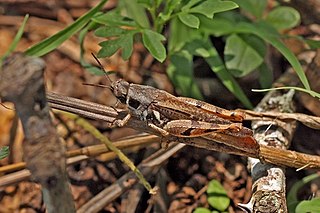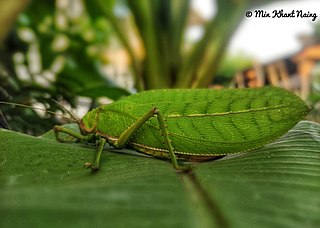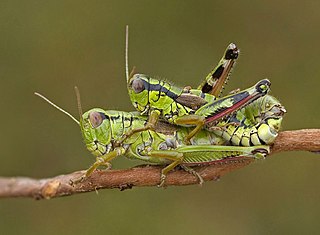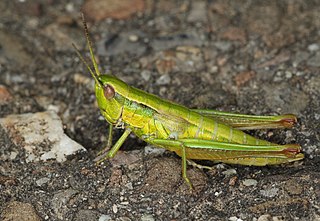
The subfamily Catantopinae is a group of insects classified under family Acrididae. Genera such as Macrotona may sometimes called "spur-throated grasshoppers", but that name is also used for grasshoppers from other subfamilies, including the genus Melanoplus from the Melanoplinae.

Bandwings, or band-winged grasshoppers, are the subfamily Oedipodinae of grasshoppers classified under the family Acrididae. They have a worldwide distribution and were originally elevated to full family status as the Oedipodidae. Many species primarily inhabit xeric weedy fields, and some are considered to be important locusts:

The grasshopper subfamily Acridinae, sometimes called silent slant-faced grasshoppers, belong of the large family Acrididae in the Orthoptera: Caelifera.

Lentula is a small genus of grasshoppers native to southern Africa. It is the type genus of the family Lentulidae.

The subfamily Pseudophyllinae contains numerous species in the family Tettigoniidae, the katydids or bush crickets. Sometimes called "true katydids", together with the crickets of suborder Ensifera, they form part of the insect order Orthoptera which also contains grasshoppers.

The Phaneropterinae, the sickle-bearing bush crickets or leaf katydids, are a subfamily of insects within the family Tettigoniidae. Nearly 2,060 species in 85 genera throughout the world are known. They are also known as false katydids or round-headed katydids.

Acridoidea is the largest superfamily of grasshoppers in the order Orthoptera with species found on every continent except Antarctica.

Gomphocerinae, sometimes called "slant-faced grasshoppers", are a subfamily of grasshoppers found on every continent but Antarctica and Australia.

Eumastacidae are a family of grasshoppers sometimes known as monkey- or matchstick grasshoppers. They usually have thin legs that are held folded at right angles to the body, sometimes close to the horizontal plane. Many species are wingless and the head is at an angle with the top of the head often jutting above the line of the thorax and abdomen. They have three segmented tarsi and have a short antenna with a knobby organ at the tip. They do not have a prosternal spine or tympanum. Most species are tropical and the diversity is greater in the Old World. They are considered primitive within the Orthoptera and feed on algae, ferns and gymnosperms, the more ancient plant groups.

Anacridium is a genus of "tree locusts" or "bird grasshoppers" belonging to the subfamily Cyrtacanthacridinae.

Pamphagidae is a family of grasshoppers belonging to the superfamily Acridoidea. The species in this family can be found in Africa, Europe and Asia.

Oxyinae is subfamily of grasshoppers in the family Acrididae. Species are distributed throughout Africa and Australasia.

Catantops is a genus of grasshoppers in the tribe Catantopini and is typical of the subfamily Catantopinae. Species can be found in Africa, including Madagascar and subcontinental India.

The Cyrtacanthacridinae are a subfamily of Orthoptera: Caelifera in the family Acrididae. They are sometimes referred-to as bird locusts, criquets voyageurs in French-speaking Africa, and Knarrschrecken in German.

The Coptacrinae are a subfamily of Acrididae in the Orthoptera: Caelifera. Species can be found in Africa and Asia.

The Eyprepocnemidinae are a subfamily of Acrididae in the Orthoptera: Caelifera. Species can be found in Africa, mainland Europe and Asia.

The Hemiacridinae are a subfamily of Acrididae in the Orthoptera: Caelifera. Species can be found in Africa and Asia.

The Orthacridinae are a sub-family of grasshoppers in the family Pyrgomorphidae. Species are found in: Central America, Africa, Asia, Australia and certain Pacific Islands. The type genus is Orthacris and the taxon proposed by Bolívar in 1905.

Cladonotinae is a subfamily of groundhoppers containing more than 70 genera and 260 described species. These insects are found in tropical areas world-wide.




















